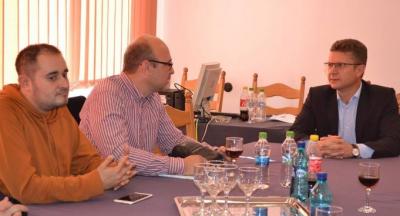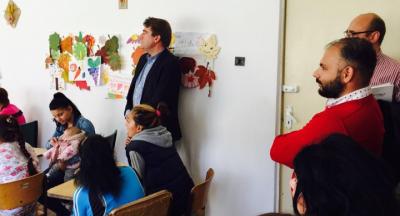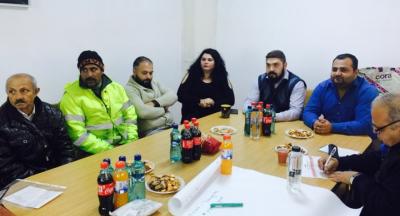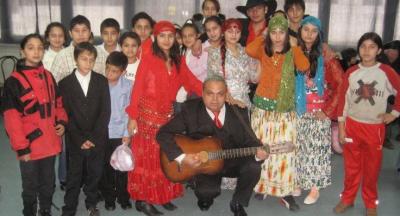Ludus
*Disclaimer: The information and views set out in this page do not necessarily reflect the official opinion of the Council of Europe and/or the European Commission. Neither the Council of Europe, the European Commission nor any person acting on their behalf may be held responsible for the use which may be made of the information contained therein.
Last update: 12/01/2017
Ludus is a city situated in the central part of the Transylvanian Plain, about 44 km from Targu Mures (residence city of Mures County) and 64 km from Cluj Napoca (residence city of Cluj County).
The total population numbers 17.5878 inhabitants. According to the latest census from 2011, the ethnic component is: Romanians – 10.108, Hungarians – 3.357, Roma - 964. Following the poll carried out by the health mediators, 1.370 Roma were identified.
Roma population is living in 6 compact communities: Cioarga has 22 households and numbers 121 inhabitants. 95% of the houses are connected to the electricity grid; 10% are connected to the sewerage network, they have central heating and their own bathroom, 50% have running water and a small part of the population benefits from the sanitation service. 20% of the community members have a salary based on a labor contract, 80% of the population benefit from social assistance (but they also provide occasional services: day work, picking mushrooms or berries, gathering recyclable materials).
Gheja has 53 households in which live 246 people; 90% of the houses are connected to the electricity grid; 10% have central heating and bathroom, 50% are connected to the sewerage network, have drinking water and a small part of the population benefits from the sanitation service.
Block no. 5 - 197 people live in 49 apartments connected to the electricity and sewerage network and have their own bathroom; 50% have central heating and all members of the community benefit from the sanitation service. 50% of community members have a salary based on an employment contract, 10% have earnings from working abroad, 20% of the population benefit from social assistance (they also offer occasional work).
Old Center- 70 households / houses where 337 people live; 98% of the houses are connected to the electricity grid; 10% have central heating and bathroom and are connected to the sewerage network, 50% have drinking water. 30% of the community members have a salary based on a labor contract, 10% have earnings from working abroad, 10% from begging, 85% of the population benefit from social assistance (but also provide occasional work).
Marasesti community numbers 53 households and 267 Roma population; all houses are connected to the electricity grid, 50% have drinking water (but no sewerage network), 20% have a bathroom. 20-30% of the community members have a salary based on a labor contract, 10% have incomes from begging, 85% of the population benefit from social assistance.
Alba community numbers 22 households and 108 people.
The total Roma population living in compact communities numbers 1.276 people of which 496 are under 14.
The ROMACT Process
ROMACT process started on October 2016. The Joint Action Plan (JAP) was approved on September 28, 2017.
The Community Action Group (CAG) identified the short/medium/long-term needs and solutions:
HOUSING AND SMALL INFRASTRUCTURE:
- Building a Multifunctional Social Centre to serve underprivileged population;
- Facilitating access to a social, public, private dwelling;
- Solve the issues of land and housing ownership;
- Rehabilitate buildings owned by the local authority and populated by disadvantaged / Roma families;
- Support for Roma communities affected by natural disasters or in extreme situations; - Building 50 social homes in the benefit of Roma families with many children and very low income;
- Connection to electricity, drinking water, sewage, methane gas, sanitation; - Road repairs and pedestrian walkways rehabilitation in the community;
- Solving the problem of stray dogs.
SOCIAL INFRASTRUCTURE:
- Initiating programs to prevent and combat discrimination against Roma children;
- Organizing campaigns to prevent child abuse and neglect, as well as all the phenomena that can cause separation of the child from the family.
HEALTH:
- Start the registration procedures for Roma persons not registered with the family doctor;
- Extending the network of health mediators to work within the Roma communities;
- Regularly carrying out health education / education activities at the level of the Roma communities (Sexually Transmitted Diseases, healthy eating, sanitation etc.);
- Establishment of a social bath to serve two poor communities inhabited by ethnic Roma, respectively Cioarga and Oarba Streets.
EDUCATION:
- Developing support programs aimed to stimulate school attendance, to reduce absenteeism and to achieve school success in pre-university education;
- Free urban transport for schoolchildren residing in Gheja;
- Ensuring equal, free and universal access of Roma minority to quality education at all levels;
- Develop "Secondary School" and "Second Chance" programs
- Organizing competitions, extracurricular activities and school camps that provide facilities for children / pupils from disadvantaged groups;
- Employing a school mediator belonging to the Roma minority;
- Implementing parental education programs / activities and encouraging the participation of Roma parents in the educational process.
EMPLOYMENT:
- Promoting entrepreneurship among local communities as a solution to finding solutions to the complex problems identified in local communities;
- Identifying flexicurity work opportunities for vulnerable groups, income generating and small business activities for families, apprenticeship or tutoring programs, providing support for access to education and care services;
- Selection, counselling and guidance of Roma people looking for a job, persons who have not completed primary or secondary education, to educational establishments;
- Organizing job fairs for all categories of job seekers, including Roma;
- Providing training courses and identifying ways of recognizing the professional competences of Roma minority citizens, obtained outside the formal framework, in order to facilitate inclusion in the labor market;
- Identifying sources of funding for self-employment, supporting CV preparation and interviews.
CULTURE:Supporting Roma NGOs in organizing social-cultural events with specific inspiration from Roma folklore and culture:
- The Roma Ethnic Fest - April 8;
- Establishment of a local NGOs to solve the Roma population problems;
- Organizing events promoting Roma culture: conferences, seminars, scientific sessions, exhibitions art galleries and other courses, Romani language courses, Roma history and culture classes etc.
With ROMACT expertise, the city hall applied for European funding and received help to implement projects related to reducing the number of marginalized communities at risk of poverty and social exclusion through integrated measures.
The Municipality benefited of ROMACT expertise for the following project:
* “EduSmart”, OPHC 6.1
Budget: 1 700 000 euros
Status: approved
Several trainings were also provided:
Trainings provided for the local administration:
Applying for European Structural Funds - EduSmart project status, funded under 6.1 Axis - School for all, European Funds
Analysis of the budget chapters and allocated amounts
Training on legislation - the approval process/ the rectification process of the local budget
Training on National Program for Local Development – PNDL
Activities involving the community action group:
Training on community development and civic participation
Collecting funds for the first community action
Health campaign
RMUSP Applications for students
Training related to job market (Needs evaluation for employment/ Market research/ Submission of tenders/ Appointments interviews)




